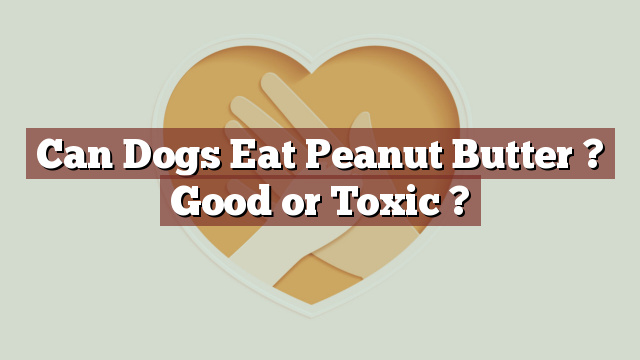Can Dogs Eat Peanut Butter? Good or Toxic?
Dogs love peanut butter, and many pet owners enjoy using it as a treat or for hiding medication. However, it is essential to know which foods are safe for our furry friends to consume. In the case of peanut butter, the answer is yes, dogs can eat peanut butter, but with certain precautions. Let’s explore the nutritional value, safety, potential risks, and benefits associated with feeding dogs peanut butter.
Nutritional Value of Peanut Butter: Essential Nutrients for Dogs
Peanut butter offers several essential nutrients that can be beneficial for dogs. It is a good source of protein, healthy fats, and vitamins E and B. Protein is essential for muscle development and repair, while healthy fats contribute to a shiny coat and overall skin health. Vitamin E acts as an antioxidant, supporting the immune system, and vitamin B aids in metabolism and energy production.
Is Peanut Butter Safe or Toxic for Dogs? Expert Opinions
According to experts, peanut butter is generally safe for dogs to consume. However, it is crucial to check the label and ensure that the peanut butter does not contain xylitol, an artificial sweetener. Xylitol can be highly toxic to dogs, leading to a rapid release of insulin, which can cause hypoglycemia or liver failure in severe cases. Therefore, it is essential to choose a peanut butter brand that does not contain xylitol.
Potential Risks and Benefits of Feeding Dogs Peanut Butter
While peanut butter is generally safe, there are a few risks and benefits to consider. One potential risk is the high-calorie content of peanut butter, which can contribute to weight gain if fed excessively. Additionally, some dogs may have allergies or sensitivities to peanuts, so it is important to monitor their reaction when introducing peanut butter for the first time.
On the flip side, peanut butter can offer health benefits to dogs. Its high protein content can be beneficial for active dogs or those needing to build muscle. The healthy fats in peanut butter promote a glossy coat and can provide an energy boost. Moderate consumption of peanut butter can also serve as a mental stimulant, as dogs often enjoy licking it from toys or puzzle feeders.
What to Do If Your Dog Accidentally Eats Peanut Butter
If your dog accidentally consumes peanut butter that contains xylitol, it is crucial to seek veterinary assistance immediately. Signs of xylitol poisoning in dogs include vomiting, loss of coordination, seizures, and in severe cases, liver failure. Time is of the essence, so contacting a veterinarian promptly is crucial.
Conclusion: Moderation and Proper Monitoring are Key for Safe Consumption
In conclusion, while peanut butter can be a safe and enjoyable treat for dogs, it is essential to exercise moderation and proper monitoring. Choose peanut butter brands that do not contain xylitol, as it can be toxic for dogs. Additionally, be mindful of the high-calorie content and potential allergic reactions. As with any new food, introduce peanut butter gradually and observe your dog’s response. If in doubt, always consult your veterinarian for personalized advice regarding your dog’s specific dietary needs. With responsible feeding practices, peanut butter can be a tasty and nutritious addition to your dog’s diet.
Thank you for investing your time in exploring [page_title] on Can-Eat.org. Our goal is to provide readers like you with thorough and reliable information about various dietary topics. Each article, including [page_title], stems from diligent research and a passion for understanding the nuances of our food choices. We believe that knowledge is a vital step towards making informed and healthy decisions. However, while "[page_title]" sheds light on its specific topic, it's crucial to remember that everyone's body reacts differently to foods and dietary changes. What might be beneficial for one person could have different effects on another. Before you consider integrating suggestions or insights from "[page_title]" into your diet, it's always wise to consult with a nutritionist or healthcare professional. Their specialized knowledge ensures that you're making choices best suited to your individual health needs. As you navigate [page_title], be mindful of potential allergies, intolerances, or unique dietary requirements you may have. No singular article can capture the vast diversity of human health, and individualized guidance is invaluable. The content provided in [page_title] serves as a general guide. It is not, by any means, a substitute for personalized medical or nutritional advice. Your health should always be the top priority, and professional guidance is the best path forward. In your journey towards a balanced and nutritious lifestyle, we hope that [page_title] serves as a helpful stepping stone. Remember, informed decisions lead to healthier outcomes. Thank you for trusting Can-Eat.org. Continue exploring, learning, and prioritizing your health. Cheers to a well-informed and healthier future!

